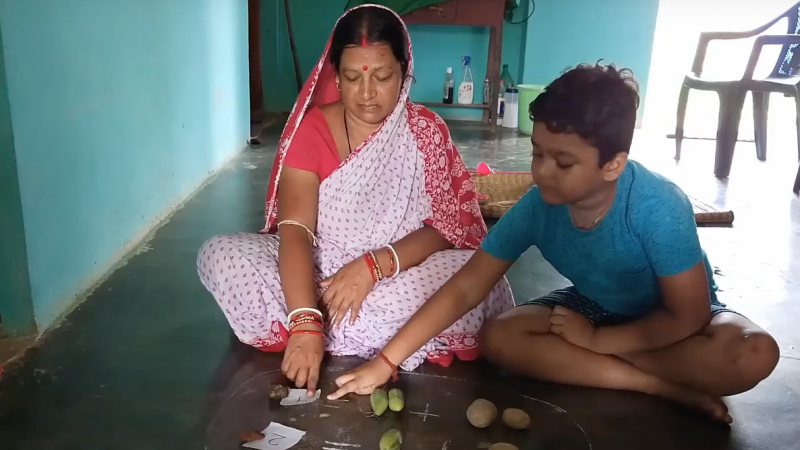‘It’s like Zoom, minus the video and the interaction’

Parents performing educational activities with children using ThinkZone's resources received via mobile phone. Screenshot of YouTube video by ThinkZone.
As classes shifted to virtual environments in India following the COVID-19 lockdown, students from remote areas and low-income families who lacked internet access faced tremendous challenges in keeping up with their studies.
India entered lockdown in March and only in June began gradually lifting restrictions. Classes were shifted to virtual environments, despite the fact that only a quarter of all Indian households have internet access.
An award-winning non-profit start-up from the city of Cuttack, in the state of Odisha, has found a way to help struggling families: Through non-internet-based technologies, such as voice calls, SMS, and radio, they're providing low-cost education to over 5,000 children in 400 villages.
Social entrepreneur Binayak Acharya came up with the idea five years ago. Along with community educators, Anganwadi (rural child care workers), and primary school teachers, he developed an early-grade education methodology called ThinkZone for children from under-resourced communities.
During the lockdown, ThinkZone's methods proved effective. As schools shut down, ThinkZone partnered with FM 104 Radio Choklate, a local station in Odisha, to broadcast lessons. Chandrima Banerjee reviewed the program at the Times of India — “It’s like Zoom, minus the video and the interaction. But it works.”

This is the place where ThinkZone’s Early-Childhood Education program started five years ago. Image used with permission.
ThinkZone's educators also use voice calls, interactive voice response (IVR) and SMS to teach modules. The system is free and operates in two ways: With “Pull Calling,” parents call a number or send an SMS which will grant them access to daily learning modules for their children. In “Push Calling,” ThinkZone offers daily 1-2 minutes of IVR-based calls and tailored SMS modules.
Acharya's organization also developed “Do-It-Yourself” activities for parents to use with their children at home, in combination with non-internet-based technologies.
Children in four districts of Odisha – Cuttack, Kendrapara, Khordha, and Bhadrak – have benefitted from ThinkZone’s programs. Their initiatives also employ over 300 women from the districts.
What keeps us going? Read these amazing stories, reviews and feedback from parents who have been a part of our Home Based Learning Program.
Celebrating #NationalParentsDayhttps://t.co/LfBUFYGPeO pic.twitter.com/lOcjmzkjzi— ThinkZone (@ThinkZoneIndia) July 26, 2020
Schooling in a pandemic
According to UNESCO, over 1.37 billion students in 138 countries worldwide have been affected by school and university closures since the start of the COVID-19 pandemic. Over 60.2 million teachers are away from the classroom, and many of them are teaching through some sort of technology.
While the school year in India is due to begin in September, there is still no clear national plan for resuming offline classes in the country.
“Many children will not be returning return right away because parents will be hesitant, wanting to keep their children safe,” Acharya said in an interview with the International Youth Foundation.
While other non-profits in India are using similar methods, such as providing remote classes through popular low-bandwidth apps like WhatsApp, wide-scale solutions aren't simple. ThinkZone's 5,000 children are a drop in the ocean when considering India's 320 million students affected by the lockdown.
Meanwhile, Twitter user Sangsan reminds that some students in the Indian state of Mangalore have to reach the hilltop to attend online classes due to connectivity issues:
Dear @narendramodi @HPoonja Sir. Right to education is for every student/child. More than 100 kids in this remote village are struggling for the same by climbing hills in forest areas, facing risk from wild animals too. Please help. https://t.co/u8RDH4MxeR pic.twitter.com/NQEB7ipCGd
— Sangsan (@Sangsan31796804) July 28, 2020

Barsha can communicate better with her family and friends after she joined the ThinkZone's education program. Image used with permission.
Besides, not just children from low-income community suffer from the transition to virtual — children with learning disabilities also have a harder time adapting, as Researcher Seema Nath tweets:
Children with a disability across several states in India including Odisha, are facing a huge risk of dropping out of school as they are not being able to cope with online/digital medium for their classes during the Covid-19 pandemic.https://t.co/LPStlO3X48
— Seema Nath (@seemanath) July 27, 2020
And Janhavi Apte writes an Op-Ed at Statecraft urging the government to build better infrastructures for remote learning:
The COVID-19 pandemic has exposed the severe inequalities that exist between the rich and the poor, rural and urban households, and between males and females. These disparities lay bare the pitfalls in access to education in India, even on virtual platforms. While a push towards remote learning is understandable in these trying times, the current system is insufficient to serve as a suitable alternative to in-person learning. Following the current trajectory, an inability or unwillingness to build and strengthen the education infrastructure in the country will only push the poor, vulnerable and disadvantaged even further into the margins of society, and even worse, leave them behind.
Post a Comment